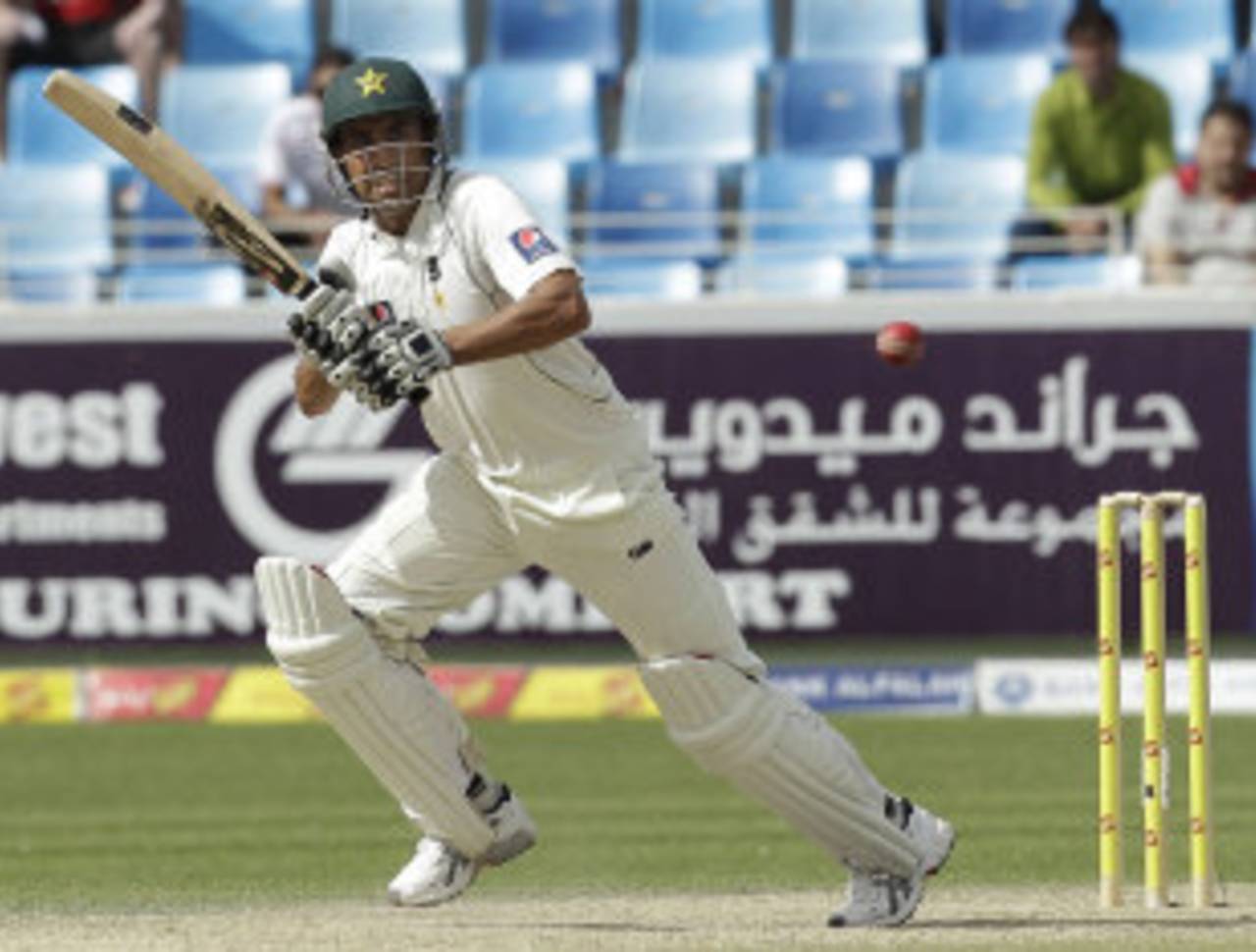Younis raises Pakistan's standard
Misbah-ul-Haq's Pakistan worked a miracle to inflict a whitewash on the world's top side, only the fifth occasion that a Pakistan team has achieved that landmark
Kamran Abbasi
25-Feb-2013

Younis Khan delivered a lesson in the lost art of playing spin bowling • Associated Press
Pakistan cricket lived a dream beyond its wildest imagination in the stadiums of Arabia. Misbah-ul-Haq's Pakistan worked a miracle to inflict a whitewash on the world's top side, only the fifth occasion that a Pakistan team has achieved that landmark. England were expected to be formidable opponents, likely to expose Pakistan's progress as superficial. England improved with the series but not enough to challenge Pakistan's dominance. The rapid progress that Pakistan have made in the last 12 months was sealed with an English kiss.
Determination and tenacity are trademarks of this new Pakistan, although there is no shortage of skill in the spin attack, the best in Asia, or the pace of Umar Gul, a threat with new ball and old. In Azhar Ali and Asad Shafiq, Pakistan have young batsmen of sound temperament, a trait often lacking in emerging Pakistani talent. At the helm, Misbah, the mild-mannered miser of Mianwali, has galvanised his troops in a fashion unseen since the days of Imran Khan. Mohsin Khan, a flashing blade in Imran's team, has been just as sharp in his astute handling of Pakistan's progress.
In a series dominated by Pakistan's spin bowlers and the DRS, batsmen have been befuddled, embarrassed, even shell shocked. This mysterious art of spin has left some of the world's best players tortured wrecks; a mental monster devoured confidence and frazzled nerves. Indeed, both sides struggled at the crease; the batsman's series we expected was a bowler's paradise. In these unexpected circumstances, Younis Khan's innings in the final Test might just be the performance of the contest.
Younis is a happy cricketer, a smile super-glued to his Pathan features. He treats success and failure with equal levity, as demonstrated by a jovial acceptance of his status as former captain. Beneath that pleasant exterior is a fearless man of dignity and deep principles. Fate has been unkind to Younis in his personal life; deaths and tribulations have visited regularly, offering perspective to any trifling punishments and banishments meted out by his erratic employer, the Pakistan Cricket Board.
Younis has been an unassuming warrior, overshadowed by Inzamam-ul-Haq and Mohammad Yousuf, a third man in Pakistan's great middle order of the last decade. Perhaps he struggled to create a career-defining moment despite a mighty record and a Twenty20 World Cup win to his credit? His batting style lacks the stubborn clout of Inzamam or the fluent grace of Yousuf. His love-hate relationship with the Pakistan captaincy alienated supporters, when Bob Woolmer groomed him to lead. But dignified patience is finally earning Younis the rewards his class deserves.
Much of the series was a disappointing one considering Younis's recent form, although failure would have been lost amid the wasteland of poor batting that both sides inhabited. Younis, however, rose above his peers, delivering a lesson in the lost art of playing spin bowling. His feet hurried like those of a tightrope walker balancing without nerve down every line the England bowlers chose to bowl, bat twirling in front of pad. He read turn from the bowler's hand and watched it fizz from the pitch. He danced down the wicket, he swept and manoeuvred, but above all else he dominated.
It was the innings of the series and Azhar was swept along beside him, urged to produce a career-defining knock of his own, learning from the master, imitating, supporting, and growing in stature. In a decade's time, when Azhar reflects on his career, he will remember this partnership with Younis as the moment that an earnest youth won his international spurs. For the genius of Younis's innings wasn't simply in its brilliant execution, it was also in the way that he inspired a Man-of-the-Match performance from Azhar, demoralised England's bowlers and reminded their batsmen that mastering high-class spin is an art that is currently beyond them.
A whitewash covers blemishes, and this Pakistan team is a few coats from perfection. Dominating in home conditions is a world away from global success. A vigilant cricket board will have observed that Pakistan didn't convince at the top of the order and struggled to find a gear change until Younis broke free. The best international teams possess an accomplished wicketkeeper batsman and a bowling allrounder. Adnan Akmal didn't do enough to win a long-term place and the second fast bowler was a passenger in each Test.
For these reasons, Misbah's Pakistan team isn't the strongest the country has produced but it might just be the team that makes the most of its attributes; a whole greater than the sum of its parts, an example of the value of unity when a nation yearns to be one. These are critical days in the history of Pakistan, times of damaging uncertainty and grave insecurity, with politicians, soldiers and lawmen playing with people's lives, a persecuted population looking for a way out. Out of this storm, Pakistan's cricketers have done what politicians, soldiers and lawmen have failed to do: they have united a nation and shown that adversity is no barrier to the hopes and dreams of their embattled countrymen.
A whitewash against England is satisfying enough but Pakistan's success in cricket is a clarion call to a nation, a faithful testament to unity and discipline.
Kamran Abbasi is an editor, writer and broadcaster. He tweets here